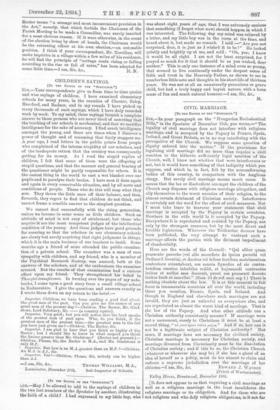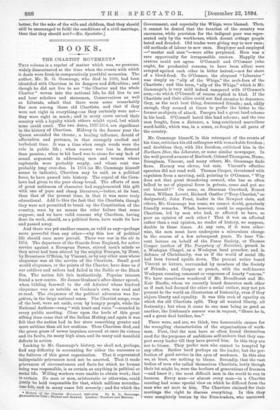CIVIL MARRIAGE.
[To TEl EDITOR OP TER "SPECTATOR."] Slia—In your paragraph on the "Hungarian Ecclesiastical Bills," in the Spectator of December 15th, you wrote,—" The legality of civil marriage does not interfere with religious marriage, and is accepted by the Papacy in Prance, Spain, Ireland, and Great Britain, as in no way interfering with the prerogative of the Church. We suppose some question of dignity entered into the matter." If the provisions for legalising civil marriage did no more than require a civil sanction to the hitherto sufficiently legal sanction of the Church, well, I know not whether that were interference or not, but it would have something of that indignity which you suppose, and which is, in fact, felt by the nonconforming bodies of this country, in comparison with the Anglican clergy. But surely civil marriage means much more. It means that the lax or disobedient amongst the children of the Church may dispense with religious marriage altogether, and ally themselves to the worst enemies of their religion, to the almost certain detriment of Christian society. Interference is certainly not the word for the effect of such measures. But I must take leave to traverse your statement that civil marriage is accepted by the Papacy in certain countries. Nowhere in the wide world is it accepted by the Papacy. Everywhere it is reprobated and resisted by the Papacy, not only by the strongest censures, but by the most direct and forcible legislation. Wherever the Tridentine decrees have been published, the very attempt to contract such a marriage affects the parties with the diriment impediment of clandestinity.
Here are the words of the Council: " Qui aliter quam praosente parocho (vel alio sacerdote de ipsius parochi vel Ordinarii licentia), et duobus vel tribus testibus, matriraonium contrabere attentabant, eos sancta Synodus ad sic contra- hendum omnino inhabiles reddit, et hujusmodi contractus irritos et nullos ease decernit, prout eos praesenti decreto irritos faeit et annullat." (Sees. 24 de ref. mat. cap I.) There is nothing obsolete about the law. Ills at this moment in full force in innumerable countries all over the world, including those you mention, France, Spain, and Ireland. And though in England and elsewhere such marriages are not invalid, they are just as unlawful as everywhere else, and are reprobated as almost the worst kind of sacrilege. That is the law of the Papacy. And what other attitude can a Christian authority consistently assume P If marriage were not a sacrament, surely to Christians it must be at least a sacred thing, " t.ctiaTipioY Torn.° Ftiya." And if so, how can it not be a legitimate subject of Christian authority P But more, if marriage laws are necessary for civilised society, Christian marriage is necessary for Christian society, and marriage divorced from Christianity must be the dissolution of Christian society ; and if this be so, the Christian Church (whatever or wherever she may be), if she has a ghost of an idea of herself as a polity, must do her utmost to claim and os enforce a supreme jurisdiction overEpthweAnp J wwr
Valley House, Brentwood, December 18th.
[It does not appear to us that requiring a civil marriage as well as a religious marriage in the least invalidates the religious marriage or its obligation. And for those who are not religious and who defy religious obligations, is it not far better, for the sake of the wife and children, that they should still be encouraged to fulfil the conditions of a civil marriage, than that they should, not F—En. Spectator.]


































 Previous page
Previous page